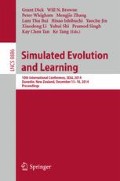Abstract
Search-based method using meta-heuristic algorithms is a hot topic in automatic test data generation. In this paper, we develop an automatic test data generating tool named particle swarm optimization data generation tool (PSODGT). The PSODGT is characterized by the following two features. First, the PSODGT adopts the condition-decision coverage (C/DC) as the criterion of software testing, aiming to build an efficient test data set that covers all conditions. Second, the PSODGT uses a particle swarm optimization (PSO) approach to generate test data set. In addition, a new position initialization technique is developed for PSO. Instead of initializing the test data randomly, the proposed technique uses the previously-found test data that can reach the target condition as the initial positions so that the search speed of PSODGT can be further accelerated. The PSODGT is tested on four practical programs. Experimental results show that the proposed PSO approach is promising.
Access this chapter
Tax calculation will be finalised at checkout
Purchases are for personal use only
Preview
Unable to display preview. Download preview PDF.
References
National Institute of Standards and Technology, “Then Economic Impacts of Inadequate Infrastructure for Software Testing,” Planning Report 02-3 (May 2002)
Myers, G.J., Sandler, C., Badgett, T.: The art of software testing. John Wiley & Sons (2011)
Díaz, E., Tuya, J., Blanco, R.: Automated Software Testing Using a Metaheuristic Technique Based on Tabu Search. In: Proc. 18th IEEE Int’l Conf. Automated Software Eng., pp. 310–313 (2003)
Michael, C.C., McGraw, G., Schatz, M.A.: Generating software test data by evolution. IEEE Trans. Software Eng. 27(12), 1085–1110 (2001)
Bottaci, L.: Instrumenting Programs with Flag Variables for Test Data Search by Genetic Algorithm. In: Proc. Genetic and Evolutionary Computation Conf., pp. 1337–1342 (2002)
Li, A., Zhang, Y.-L.: Automatic Generating All-Path Test Data of a Program Based on PSO. In: WRI World Congress on Software Eng., pp. 189-193 (2009)
Windisch, A., Wappler, S., Wegener, J.: Applying Particle Swarm Optimization to Software Testing. In: Proc. 9th Ann. Genetic and Evolutionary Computation Conf., pp. 1121–1128 (2007)
Cui, H.-H., Chen, L., Zhu, B., Kuang, H.-L.: An Efficient Automated Test Data Generation Method. In: Int’l Conf. Measuring Technology and Mechatronics Automation, vol. 1, pp. 453–456 (2010)
Zhang, S., Zhang, Y., Zhou, H., He, Q.-Q.: Automatic Path Test Data Generation Based on GA-PSO. In: Proc. IEEE Int’l Conf. Intelligent Computing and Intelligent Systems, pp. 142–146 (2010)
Kennedy, J., Eberhart, R.: Particle swarm optimization. In: Proc. IEEE Int’l Conf. Neural Networks, vol. 4, pp. 1942–1948 (1995)
Frankl, P., Hamlet, D., Littlewood, B., Strigini, L.: Choosing a Testing Method to Deliver Reliability. In: Proc. Int’l Conf. Software Eng., pp. 68–78 (1997)
Chang, K.H., Cross II, J.H., Carlisle, W.H., Liao, S.-S.: A Performance Evaluation of Heuristics-Based Test Case Generation Methods for Software Branch Coverage. Int’l J. Software Eng. and Knowledge Eng. 6(4), 585–608 (1996)
Clarke, L.A.: A System to Generate Test Data Symbolically and Execute Programs. IEEE Trans. Software Eng. 2(3), 215–222 (1976)
Offutt, A.J.: An Integrated Automatic Test Data Generation System. J. Systems Integration 1, 391–409 (1991)
Korel, B.: Automated Software Test Data Generation. IEEE Trans. Software Eng. 16(8), 870–879 (1990)
Sofokleous, A.A., Andreou, A.S.: Automatic, evolutionary test data generation for dynamic software testing. J. Systems and Software 81(11), 1883–1898 (2008)
Harman, M., McMinn, P.: A theoretical and empirical study of search-based testing: Local, global, and hybrid search. IEEE Trans. Software Eng. 36(2), 226–247 (2010)
Shi, Y., Eberhart, R.: A modified particle swarm optimizer. In: Proc. IEEE Int’l Conf. Evolutionary Computation, pp. 69–73 (1998)
Author information
Authors and Affiliations
Editor information
Editors and Affiliations
Rights and permissions
Copyright information
© 2014 Springer International Publishing Switzerland
About this paper
Cite this paper
Jia, YH., Chen, WN., Zhang, J., Li, JJ. (2014). Generating Software Test Data by Particle Swarm Optimization. In: Dick, G., et al. Simulated Evolution and Learning. SEAL 2014. Lecture Notes in Computer Science, vol 8886. Springer, Cham. https://doi.org/10.1007/978-3-319-13563-2_4
Download citation
DOI: https://doi.org/10.1007/978-3-319-13563-2_4
Publisher Name: Springer, Cham
Print ISBN: 978-3-319-13562-5
Online ISBN: 978-3-319-13563-2
eBook Packages: Computer ScienceComputer Science (R0)

